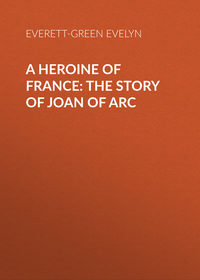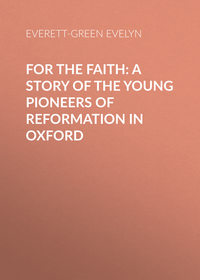 полная версия
полная версияA Clerk of Oxford, and His Adventures in the Barons' War
Out through the gate, just as the youths approached it, came a couple of Masters in their gowns and hoods. Leofric and Jack scanned them curiously, and eagerly inquired of their companions who they were.
"Nay, I know not the names of all the Masters in the city," answered Hugh, laughing; "there be too many for that. Belike they have been lecturing in School Street this forenoon, and are going back to their Halls. Some of these same Masters will like enough come and invite you twain to attend their lectures; but give not too ready an answer to the first who asks. Rather visit several and pick out those who please you most. It is oft the poorest and least learned who are most eager for listeners, the better sort having always their lecture-rooms full."
And now they were actually within the city precincts. Smith Gate being so close to School Street, the eager eyes of the two new-comers were immediately gratified by the sight of many hurrying figures of clerks and Bachelors and Masters, some going this way and some the other, talking earnestly together, disputing with some warmth and eloquence, or singing snatches of songs, like boys released from school.
It was not easy for unaccustomed eyes to distinguish the rank of the various passers-by; for academic dress was still in its infancy, and there were few, if any, statutory rules respecting it. The habit of the clerk was very much what he wore at home, and the black cappa of Bachelor or Master was often the same, though Masters were beginning to wear the square, tufted cap, and had the right to the miniver hood of the nobles and beneficed ecclesiastics. The scarlet gown of the Doctor had just come into use, but was at present seldom seen, as many were unable to purchase so costly a robe. The most common garment for every person in the University was the "tabard" with the girdle, and these tabards might be either red, black, or green; but black was the commonest colour, as being the most serviceable in daily wear.
Fain would the lads have lingered to watch the shifting throng of clerks and their preceptors, as they streamed out from the lecture-rooms for the mid-day meal; but Hugh and Gilbert laughed at their eager curiosity, and drew them along to the left down Hammer Hall Lane, pausing suddenly upon reaching a small turret in the wall, which once had been open to the street, but was now closed in by a few mouldering boards.
"Good!" cried Gilbert, as he pulled aside one of the boards; "the place has not been taken. Now look well at it, you two, and see if you think you can make shift to live here till a better place offers."
Pushing their way within the circular recess, the lads saw that a rude stairway led up to some sort of chamber overhead. Mounting the rickety steps with care – for they had become loose and rotten – they found themselves in a small and not unpleasing little chamber, lighted by several long, narrow loopholes, and roofed in securely from the weather overhead.
The flooring was rather decayed, and there was a mouldering smell pervading the place; but its former occupants had done various things to render habitation possible. A fireplace and chimney had been contrived in one corner, and some rude shutters had been affixed to keep out the cold air at night, or in inclement weather. A rickety shelf that would serve as a table still hung drooping from its nail. Plainly the place had been lived in before, and might well be again. Leofric and Jack looked round it, and smiled at one another.
"We could live here like princes, if there be nothing to hinder," said the latter. "Can we come and fix our abode here without making payment to any one?"
"Marry yes, since nobody uses the place. There be many such nooks along the walls, and poor clerks have settled themselves there again and again, no man saying them nay. In times of war they might post archers or marksmen at these loopholes; but short of a siege, I trow none will disturb you. And from without ye can climb easily upon the wall, and enjoy the air and watch what goes on beneath. Also there be the Fish Ponds just below, and I warrant ye will catch many a good supper from thence when ye be in need of a good meal."
Jack laughed, for he had no small skill as a fisherman; but just now he was all agog to see Oxford and settle into these new quarters.
"Had I but a few tools and some boards, I would fix us up bench and table, mend the stairs and the floor, and make the place as comfortable as heart could wish," he cried.
"And I would gather rushes for the floor, and wood for the fire, and we should feast right royally on the last of the provisions we laid up for the way," added Leofric.
"Then come away to Carfax, where ye can lay in such stores as ye need," cried Gilbert. "I will take you to honest Master Seaton, where I have always lodged. He will tell you where to go for all ye need, and the right price to pay: for there be dealers in the city who seek to mulct clerks and scholars, and charge them more than the fair price for goods; and the Chancellor, and even his Majesty the King, have had to interpose."
"What is Carfax?" asked Leofric, as, after depositing their goods carefully in the turret, they replaced the boards and sallied forth once more.
"Why, the meeting of the four great streets of the town – Quatrevois some folks call it – where High Street, Great Bayly Street, Fish Street, and North Gate Street all meet. St. Martin's Church is there with its great bell, and whenever there be strife 'twixt citizens and clerks, that bell booms out to gather the citizens together; whilst our rallying-point is St. Mary's, whose bell rings to warn us that they are rising against us. At other times Carfax is the chief mart of the city, and the bull-ring stands in the centre. But come, and thou shalt see for thyself; and good Master Seaton will give us all some dinner, I trow."
Gilbert led the way, and the rest followed him willingly. The streets had thinned considerably, the noontide hour having driven in clerks and masters alike to their dinner. Gilbert strode down Cat Street, and pointed out to his comrades several Halls situated there, and sounds of laughter and loud talking and jesting broke upon the ears of the passers-by, plainly indicating the proximity of considerable numbers of inhabitants.
"That was the Hall where I lived last," observed Hugh, as he pointed to a house, somewhat better than the rest, on the left-hand side as they walked down Cat Street. "Corbett's Hall it was then called; and the Master was an excellent man. I heard he was about to go elsewhere; probably I shall find a new head by now. But I will not pause there now; I will wait till the fetcher has brought in my goods and chattels. I will come with you to Carfax, and pay my respects to good Master Seaton first."
So on went the four, the pair who had never before seen a town gazing with wonder at the quaint-timbered houses on either side the street, whose projecting upper floors seemed almost to meet overhead. There was no footpath or paving of any sort; the roadway was but a track, deep in mud in winter, and in dust in summer. St. Mark's Church at the corner, where they turned into High Street, brought Leofric to a standstill, for such edifices were new to him; but his companions laughed and hurried him on, telling him he could drink his fill of churches in Oxford any day he chose, but that Master Seaton's dinner would not wait for his leisure.
On they went along this wider thoroughfare, not pausing to examine anything in detail, but taking in the general effect of a populated city, which was immensely wonderful to the two lads from the country, till Gilbert pointed to a tall tower standing out against the sunny sky, and said, —
"Yon is St. Martin's Church, and this is Carfax."
It was, as he had said before, just a meeting of the ways, but such a sight as it presented Leofric and Jack had never dreamed of. The open place seemed full of people: there were stalls on which merchandise of all sorts was being vended; loud-voiced salesmen were crying their wares, or chaffering over bargains with customers. There were shops, with signs swinging over them, that displayed a better sort of ware; and lads of all ages, from thirteen upwards, in the tabard of clerks, were strolling about, buying or examining goods, or exchanging a rough sort of banter with the townsmen. A few Masters or Bachelors would be seen threading their way through the crowd, but they did not often linger to speak to any; it was the clerks who seemed to have all the leisure, and some of these were playing games or throwing dice, whilst others looked on, encouraging or jibing the players.
"Heed not that rabble rout," said Gilbert, forcing his way towards a rather fine-timbered house at the corner, where Fish and High Streets joined; "come to Master Seaton's house, and let us hear all the news."
Gilbert led the way into a shop, where he was greeted somewhat boisterously by a merry-looking youth behind the counter. He nodded a reply, and pushed open a door which gave access to a steep and narrow staircase, and after ascending this he opened another door, and instantly a number of voices were raised in welcome and greeting.
Gilbert and Hugh pushed into the room from whence these sounds issued, whilst Leofric and Jack stood together just on the threshold, gazing about them with curious eyes.
They saw before them a quaint, pleasant room, rush-strewn, and plainly furnished with table and benches, in which a party of six was gathered, seated round the board, which was hospitably spread with solid viands.
The master of the house was easily distinguished by his air of authority and his general appearance. His wife was a comely dame, ruddy of face and kindly of aspect. On either side of her sat a pretty maiden, one of sixteen, another of fourteen summers; and the good-looking, strapping youth, who was now greeting Gilbert and Hugh right eagerly, was very plainly the son of the house. An apprentice looked on wide-eyed and silent at the apparition of four strangers; yet it was plain that neither Gilbert nor Hugh were so regarded in the Seaton household.
Not only were they joyfully received themselves, but their two comrades quickly shared in the hospitable welcome. They were placed at the table, their trenchers were heaped with good food, and the story of the encounter in the forest was eagerly listened to by all.
"There be many poor rogues who have taken to the forest in these times of scarcity," said Hal Seaton, the son. "The harvests have been bad, and prices have been raised; and the idle and prodigal have had much ado to keep body and soul together. Sometimes they take to theft and pillage, and then flee to the forest for safety; and some go thither in the hope of killing a fine buck unseen by the huntsmen, or to rob unwary travellers, especially those that be coming with full purses to pursue their studies here."
"Ay, and there be some that think there will be fighting ere long 'twixt his Majesty the King and the Barons," added Seaton himself gravely. "Heaven send such a thing come not to pass! It is ill work when brother takes up arms against brother, and city against city."
The youths would willingly have asked more of the state of parties at this stirring season, but just now personal matters were of more pressing importance. So they left politics for another time, and told about the turret hard by Smith Gate, where Leofric and Jack were about to ensconce themselves; and Hal begged a half-holiday from his duties in the shop, that he might take his tools, and some odds and ends of planks lying about in the workshop behind, and help the lads to settle themselves in.
This was willingly accorded, and Master Seaton and his wife both showed great kindness to the would-be clerks. The former unearthed from his stores some strong sacking fashioned into huge bags, that, stuffed with straw or dead leaves, did excellently for bedding; and the latter put up in a basket a liberal supply of food from her well-stocked larder, for her motherly heart went out towards the two lonely lads, coming to settle in a strange city, knowing nothing of the life before them. Leofric's blue eyes and gentle manners won her affections from the first, and no one could help liking honest Jack, who was so merry and so full of hope and courage.
Laden with a number of useful odds and ends, the little party made their way back to the turret chamber; and soon the sound of hammer, chisel, and saw spoke of rapid advance in the necessary work.
Leofric crossed the river again to gather dead leaves and bracken for bedding, wood for firing, and rushes for the floor. By the time he had collected and brought in sufficient stores, the work overhead had rapidly progressed, and he uttered an exclamation of delighted astonishment as he beheld the result of the afternoons toil.
The stairs and flooring were mended, rudely, to be sure, but strongly. Something like a fastening had been contrived to the lower entrance, so that they could use the basement of the turret as a storehouse for wood and other odds and ends. Up above, the little chamber began to look quite comfortable. The holes in the masonry had been filled up with mortar or patched by boards. The window shutters had been mended, and could now be used for keeping out inclement wind. One of the loopholes had actually been glazed by Hal's deft fingers, and he promised to keep his eyes open for any chance of picking up some more glass, so that the others might be served in the same way. To be sure, the glass of those days was none too translucent, and save in very cold weather, it was pleasanter to have the loopholes open to the light of day; but if heavy rain or bitter cold should drive the occupants to close their shutters, it was certainly advantageous if one or two of the narrow slits could be glazed, so that they would not be left in total darkness.
The shelf table against the wall had been mended, and two stools of a suitable height contrived. When the fire was lighted on the hearth, and the smoke had been coaxed to make its way up the chimney, the place wore a really cosy and home-like aspect, which was greatly enhanced after the floor was strewn with rushes, and the two mattresses stuffed and laid side by side in a little recess. The spare habits of the boys were hung against the wall on pegs, and their few worldly possessions laid in order upon the shelf which had been fixed up to receive them.
"I vow," cried Hugh, as he looked around him, "that I would almost sooner have such a lodging as this than spend my days in a Hall. There be Halls where fires are scarce known save in the coldest weather, and where the rushes lie on the floor till they rot, and become charged with so much filth that the stench drives the luckless clerks out into the streets. It hath not been so where I have lodged, 'tis true; but there be Halls wherein I would not set foot for the noisome state they are in."
Leofric and Jack were charmed with their quarters, and when their guests had bid them good-bye, and they had fastened themselves in for the night, they looked at each other with a sense of triumph and joy. Here they were, established as a pair of clerks in a lodging of their own in Oxford, where none was likely to molest them. They had money in their purses enough to last them a considerable time. They had made kind friends who would help them through the difficulties and perplexities of their first days; and surely before long they would find themselves at home in this strange city, and would enter into its busy life (of which they had caught glimpses to-day) with the zeal and energy of true students.
As they sat at their table, partaking with good appetite, though frugally, of the provisions left from the journey, seasoned by some of Mistress Seaton's dainties, they spoke together of their plans for the morrow.
"Methinks I should go to Osney, and present my letter. But I shall have no need to ask for shelter in the Domus Dei, seeing how well we be sheltered here."
"And I would fain see something of the good Grey Friars, of whom so much good is spoken in the town," answered Jack; "and we must seek out such Masters as we would learn from, and find out what fee we must pay to attend their lectures. It is not much, methinks, that each clerk gives, but we must be careful how we part with our money, for we may not find it easy to put silver in our purse when our store has melted away."
"I shall ask the Abbot of Osney if he will give me vellum or parchment to illuminate, for I have some skill that way," said Leofric; "I used to help the monks of St. Michael. I might e'en do the same here; and, perchance, I might teach thee too, good Jack."
Jack looked at his rough, red hands, and shook his head.
"I can make shift to read and write, but I never could do such work as that," he answered. "I will fish in the ponds, and snare rabbits in the woods, and make bread of mystelton for us to eat. My care shall be the larder, and thou shalt have leisure for work if thou canst get it. So will we live right royally in our nook, and learn all that Oxford can teach us!"
CHAPTER IV
THE FIRST DAY
The lads slept soundly in their new quarters, but awoke with the first light of day, eager to enter upon the strange life of the city. Making their way first to the top of the wall, they had a good look round them over the still sleeping town; and then finding a place where, by the exercise of a little activity, they could clamber down on the outer side, they refreshed themselves by a plunge in the Fish Ponds, by way of ablutions, and returned through the gate to their lodging.
They had a great curiosity to go forth together and see the city, but they did not intend immediately to decide upon the preceptor they should follow. Just at starting they felt almost too excited to settle to regular study, and the visit to the Abbot of Osney was the first business of the day.
Putting on their better habits, and making themselves as trim and neat as circumstances permitted, the boys sallied forth, and took the way to Carfax as before. They knew that Osney lay to the west of the city wall, beyond the Castle, and they had a great wish to see that building at close quarters; so they pursued their way along Great Bayly Street, till they reached the mound itself, crowned with its frowning walls and battlements.
As they passed along they saw not only numbers of clerks sallying forth to their daily lectures, but great numbers of the Black Friars, who appeared to be exercising considerable activity. Some were wheeling little trucks or carts which held loads of what appeared to be goods and chattels, and they appeared to be very busy, passing to and fro with their loads or their empty trucks, like a colony of industrious ants.
"What are they doing?" asked Jack of a bystander.
"Removing themselves from the Jewry to the new House that the King's Majesty has bestowed upon them without the city walls through Little Gate and down Milk Street," was the answer. "They came and settled in the Jews' quarter, hoping to convert the Hebrew dogs to the true faith; but methinks they have but a sorry record of converts. Anyhow they are going thence, and their new house is all but ready. A few may linger on in the Jewry, but the most part will fare forth to the more commodious building yonder."
Having thus satisfied their curiosity on that score, the boys passed onwards to the Castle, and just as they approached the West Gate, they were in time to prevent something of a catastrophe. As they drew near, they perceived that a young lady, mounted on a fair palfrey, was approaching from the outer side. She was quite young, perhaps fifteen or sixteen, and was very fair to look upon. Her hair was a dusky chestnut colour, and was loosened by the exercise of riding, so that it framed her face like a soft cloud. Her eyes were bright and soft and dark, and her figure was as light and graceful as that of a sylph. As the two lads passed under the gateway, marking her approach, they bared their heads, and glanced at her with honest admiration in their eyes.
The little lady noticed their salutation, and returned it with a gentle dignity of manner; but just at that moment a piece of rag lying in the gutter was suddenly whirled round and up by a gust of wind, right against the face of the spirited little barb she was riding.
The creature suddenly took fright, reared up on its hind legs, and then made a sudden swerve, dashing off along West Gate Street at a headlong pace.
But luckily the girl rider was not borne away too in this reckless fashion. When the creature started and reared so violently, she had been almost unseated; and Leofric, seeing this, had with one quick movement thrown his arm about her; and as soon as the palfrey swerved and made off, the lady was simply lifted from her seat and gently set down by the strong arms of both lads – for Jack had rushed up to give assistance.
She stood now in the roadway, dazed, but safe, looking from one of her preservers to the other, and faltering out broken words of thanks.
Then the servant who had been behind, and who had in vain striven to stop the runaway horse, rode up, lifted the little lady to his saddle, and carried her away, before she had sufficiently recovered her breath to do more than wave her hand to her two deliverers.
The sentry at the gate, who had now come up, looked after them with a laugh.
"Old Ralph is a grim guardian. He will never let his young mistress have speech of any. But I doubt not when it comes to the ears of the Constable, he will seek you out to reward you; for fair Mistress Alys is as the apple of his eye."
"Who was the lady?" asked Jack eagerly.
"Mistress Alys de Kynaston, only daughter of the Constable of the Castle, Sir Humphrey de Kynaston. They say she is the very light of the house, and I can well believe it."
After a little more talk about the Castle and its Custodian, the sentry directed the lads how to find Osney Abbey; and after crossing Bookbinders' Bridge and passing the Almshouses, they quickly approached the gate by which access was had to the Abbey itself.
It was a fine building, inhabited by the Canons Regular of St. Augustine. There were the Chapel, dedicated to St. Nicholas, the fine cloistered refectory, the Dormitory, the Abbot's Lodging, to say nothing of the fine kitchens, and the Domus Dei of which mention has been made.
The present Abbot was Richard de Appelton, and when Leofric presented his letter and asked speech of him, he was ushered into the presence of the great man with very little delay.
Strangers, even youthful strangers, were always received hospitably at the religious houses, and the Abbot, after reading the letter of his friend, spoke kindly to the boys, asking them whether they desired the shelter of the Domus Dei.
Leofric explained what had befallen him since that letter was penned, and how he had met with kind friends, and had already found a lodging within the walls of the town. The Abbot stroked his shaven chin, and looked from Jack to Leofric, letting his eyes rest somewhat longer upon the face of the latter as he said, —
"So thou art not as yet disposed to the religious life? Yet thou hast the face of a godly youth."
"I trust we may yet be godly without the cloister wall," answered Leofric modestly. "It is not for roistering and revelry that we have chosen to live within the town, but we would fain have some small spot that we may call our own, and I had thought that perchance I might turn such skill as I have in penmanship to account, so that I might earn fees for – "
"Ah yes, I know what thou wouldst say. Perchance we can give thee some work of that kind from time to time. But there be other ways of winning money too, open to poor clerks. Thou canst say a prayer or a grace at some rich man's table, or the Chancellor will give thee a licence to beg for thy maintenance. A likely youth, with a face like thine, will not find living hard. And if thou art ever in any trouble, thou canst always come to me. The Domus Dei is open to such as thou, and any son who comes from my good friend the Prior of St. Michael will be welcome for his sake."
Leofric thanked the Abbot gratefully, and received from him a small present in money, and two or three squares of vellum, such as were used in the making of breviaries. This was a very great acquisition for Leofric, as he could now begin some illuminating or transcribing work in his leisure hours, and by the sale of this add to their scanty store of money, and obtain the material for fresh work of a like kind.









